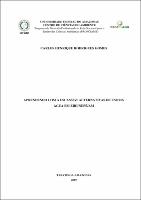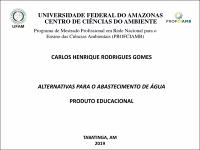| ???jsp.display-item.social.title??? |


|
Please use this identifier to cite or link to this item:
https://tede.ufam.edu.br/handle/tede/7143| ???metadata.dc.type???: | Dissertação |
| Title: | Aprendendo com a escassez: alternativas de uso da água em Eirunepé/AM |
| ???metadata.dc.creator???: | Gomes, Carlos Henrique Rodrigues  |
| ???metadata.dc.contributor.advisor1???: | Schropfer, Edivânia dos Santos |
| First advisor-co: | Cavalcante, Kátia Viana |
| ???metadata.dc.description.resumo???: | A cidade de Eirunepé (AM) apresenta problemas quanto à distribuição da água oferecida pela Companhia de Saneamento do Amazonas - COSAMA. O crescimento populacional aliado aos parcos investimentos na ampliação da rede de abastecimento força a população a buscar soluções alternativas no combate à escassez deste bem que é essencial para a sobrevivência humana. Neste sentido buscou-se entender, a partir da percepção dos discentes do IFAM/ Campus Eirunepé, como ocorre o abastecimento de água oferecido pela COSAMA, quais ações são adotadas por suas famílias quando este bem não é ofertado pelo Estado e de que forma o poder público e a população atuam na garantia da qualidade da água a todos os habitantes. A pesquisa procura responder a indagação sobre quais as alternativas de uso da água usadas pela população de Eirunepé. Ajustado à teoria da dialética da complexidade sistêmica foi realizado um estudo de caso utilizando a percepção ambiental de dezoito discentes regularmente matriculados no IFAM/Campus Eirunepé distribuídos igualmente pelos seis bairros da cidade: Nossa Senhora de Fátima, São José, Aparecida, Centro, Perpétuo Socorro e Santo Antônio. Para a coleta de dados adotou-se um plano que consiste em: Pesquisa Bibliográfica, Pesquisa Documental e Pesquisa de Campo. As técnicas para obtenção de dados na Pesquisa de Campo foram compostas por: entrevistas, debates, oficinas, desenvolvimento de textos e diário de campo. Assim os capítulos dissertarão sobre os objetivos específicos contidos no trabalho para, ao final, atender ao objetivo geral que é a elaboração de um Guia Pedagógico que descreverá as alternativas para o abastecimento de água percepção dos discentes acerca das estratégias das famílias na garantia do abastecimento de água em Eirunepé (AM). Cada capítulo procurará argumentar os seguintes tópicos: Capítulo I – Contextualização da Área de Estudo. Capítulo II – Políticas de Abastecimento de água em Eirunepé. Capítulo III – Percepção Ambiental discente sobre os meios alternativos de captação e uso da água em Eirunepé. Capítulo IV – Material Didático/Pedagógico (Produto). O estudo mostrou como as famílias atuam na obtenção da água quando não ofertada pelo poder público. Elas procuram adaptar-se às realidades que as cercam e por isso desenvolvem estratégias de sobrevivência alterando o meio no qual estão inseridos. Por fim, foi elaborado um Guia Pedagógico que tem como finalidade contribuir para a prática pedagógica docente sobre a percepção e alternativas de uso da água implementadas pelas famílias na tentativa de solucionarem possíveis problemas de fornecimento deste bem por parte do poder público. |
| Abstract: | The city of Eirunepé (AM) presents problems regarding the distribution of water offered by the Companhia de Saneamento do Amazonas - COSAMA. Population growth coupled with meager investments in expanding the supply chain forces the population to seek alternative solutions in the fight against the scarcity of this good that is essential for human survival. In this sense, it was sought to understand, from the perception of IFAM / Campus Eirunepé students, how the water supply offered by COSAMA occurs, what actions are adopted by their families when this good is not offered by the State and in what form the power and the public act to guarantee the quality of water for the population. The research seeks to answer the question about the alternatives of water use used by the population of Eirunepé. Adjusted to the dialectic theory of systemic complexity, a case study was carried out using the environmental perception of eighteen students regularly enrolled in the IFAM / Eirunepé Campus distributed equally in the six districts of the city: Our Lady of Fátima, São José, Aparecida, Centro, Perpétuo Socorro and Santo Antônio. For the collection of data a plan was adopted that consists of: Bibliographic Research, Documentary Research and Field Research. The techniques for obtaining data in the Field Survey were composed of: interviews, debates, workshops, text development and field diary. In this way, the chapters will discuss the specific objectives of the work, in order to meet the general objective of creating an informative and educational booklet describing students water supply alternatives. Each chapter will try to argue the following: Chapter I - Contextualization of the Study Area. Chapter II - Water Supply Policies in Eirunepé. Chapter III - Alternative means of water use. Chapter IV - Environmental Perception. Chapter V - Didactic / Pedagogical Material (Product). The study showed how families act in obtaining water when not offered by the public power and what transformations occur in the environment when they seek to obtain this good. They seek to adapt to the realities that surround them and therefore develop strategies of survival by changing the environment in which they are inserted. This change caused by population growth has resulted in increased underground pollution, given the number of contaminated wells in the city. This problem, for the most part, was not known to the families interviewed. Finally, a Pedagogical Guide was elaborated with the purpose of contributing to the teaching pedagogical practice, helping and enriching the awakening of the student's environmental perception about the strategies and of water use implemented by the families in an attempt to solve possible problems of supply of this good by part of the public power. |
| Keywords: | Abastecimento de água Uso da água Percepção ambiental Watersupply Water use Environmental perception |
| ???metadata.dc.subject.cnpq???: | CIÊNCIAS AGRÁRIAS |
| Language: | por |
| ???metadata.dc.publisher.country???: | Brasil |
| Publisher: | Universidade Federal do Amazonas |
| ???metadata.dc.publisher.initials???: | UFAM |
| ???metadata.dc.publisher.department???: | Centro de Ciências do Ambiente |
| ???metadata.dc.publisher.program???: | Rede Nacional para o Ensino das Ciências Ambientais |
| Citation: | GOMES, Carlos Henrique Rodrigues. Aprendendo com a escassez: alternativas de uso da água em Eirunepé/AM. 2019. 107 f. Dissertação (Mestrado em Rede Nacional para o Ensino das Ciências Ambientais) - Universidade Federal do Amazonas, Tabatinga-AM, 2019. |
| ???metadata.dc.rights???: | Acesso Aberto |
| ???metadata.dc.rights.uri???: | http://creativecommons.org/licenses/by-nc-nd/4.0/ |
| URI: | https://tede.ufam.edu.br/handle/tede/7143 |
| Issue Date: | 25-Feb-2019 |
| Appears in Collections: | Mestrado Profissional em Rede Nacional para o Ensino das Ciências Ambientais |
Files in This Item:
| File | Description | Size | Format | |
|---|---|---|---|---|
| Dissertação_CarlosHenriqueGomes_PROFCIAMB.pdf | 7.5 MB | Adobe PDF |  Download/Open Preview | |
| ProdutoEducacional_CarlosHenriqueGomes_PROFCIAMB.pdf | 4.95 MB | Adobe PDF |  Download/Open Preview |
This item is licensed under a Creative Commons License





